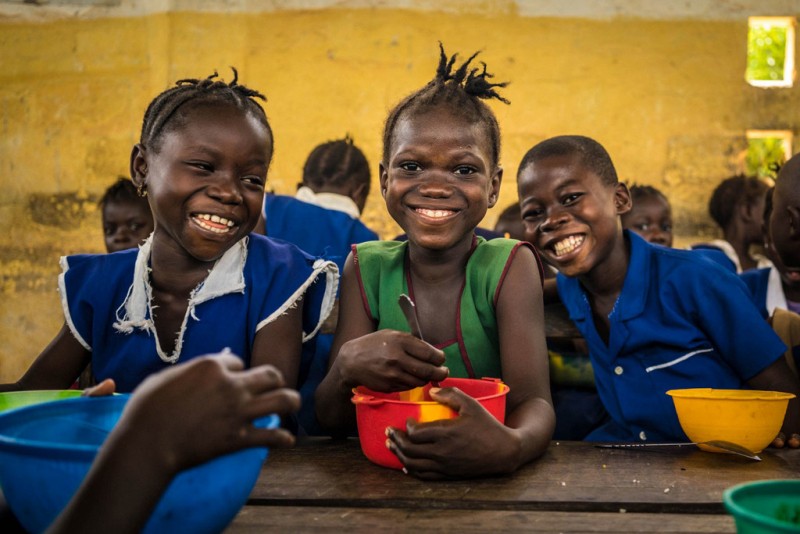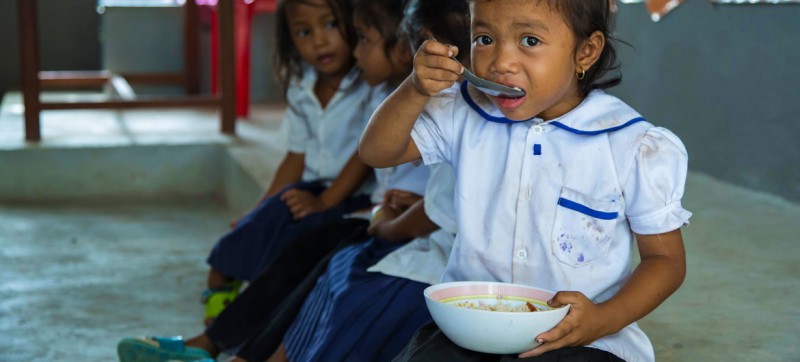A young girl eats a meal in school before beginning class in Cambodia. Following pandemic-driven school closures, five UN agencies threw their strong support behind an international coalition to improve the nutrition, health and education of school-age children around the world. In a joint declaration on Tuesday, the Food and Agriculture Organization (FAO), the UN Educational, Scientific and Cultural Organization (UNESCO), the UN Children’s Fund (UNICEF), the World Food Programme (WFP) and the World Health Organization (WHO) committed to assisting the School Meals Coalition in which over 60 countries envision a nutritious meal in school for every child in need by 2030. Led by France and Finland, the coalition also committed to “smart” school meals programmes that combine regular meals in school with complementary health and nutrition interventions for children’s growth and learning.
Thank you, @EmmanuelMacron for your leadership and dynamic support. We are thrilled to join you and so many partners to launch the @SchoolMeals_ Coalition today. Now, let’s get to work and make sure that every child has a healthy, nutritious school meal! https://t.co/oM33XBC4Ic
— David Beasley (@WFPChief) November 16, 2021
“School health and nutrition programmes are impactful interventions to support schoolchildren and adolescents’ growth and development”, the UN leaders said in their declaration.
“They can help to combat child poverty, hunger and malnutrition in all its forms. They attract children to school and support children’s learning, and long-term health and well-being”.
‘Springboard’ effects
Noting that school children are not the only ones who benefit, the UN agency heads pointed out that the meals can serve as “springboards” for food system transformation.
And where possible, they can use locally grown food to support national and local markets and food systems, thus, improving opportunities for smallholder farmers and local catering businesses – many of which are led by women.
Moreover, these programmes can contribute to achieving at least seven of the Sustainable Development Goals (SDGs).
“The School Meals Coalition has the potential to help countries recover from the COVID-19 crisis”, said WFP Executive Director David Beasley.
“School feeding programmes can get children back in school, fix the damage done to their education, create jobs locally and enable smallholder farmers to earn a sustainable living to feed their families”.
Restoring nutrition
Each of the five UN agencies will provide a specific set of expertise to the coalition, which includes more than 50 partners from non-Governmental Organizations to civil society and foundations.
The coalition will work to restore the school meals and other health and nutrition programmes that were in place before the COVID-19 crisis, expand them to reach an additional 73 million children who were not covered before the pandemic, and establish standards to raise food quality while linking them to local food production, where possible.
The UN agencies have committed to work with Governments to achieve the coalition’s goals by providing technical and operational support where needed and advocating for funding and better data on the impact of school health and nutrition programmes.
COVID’s rippling effects
In 2020, the COVID-19 pandemic caused extensive disruption to schools and education worldwide.
Millions of children were unable to get their school meals or benefit from school-based health and nutrition services such as deworming, vaccination and psycho-social support.
Today, more than 150 million children globally are still missing out on meals and essential health and nutrition services.

School meals provide essential safety nets for poor children and their families.




Comments are closed.